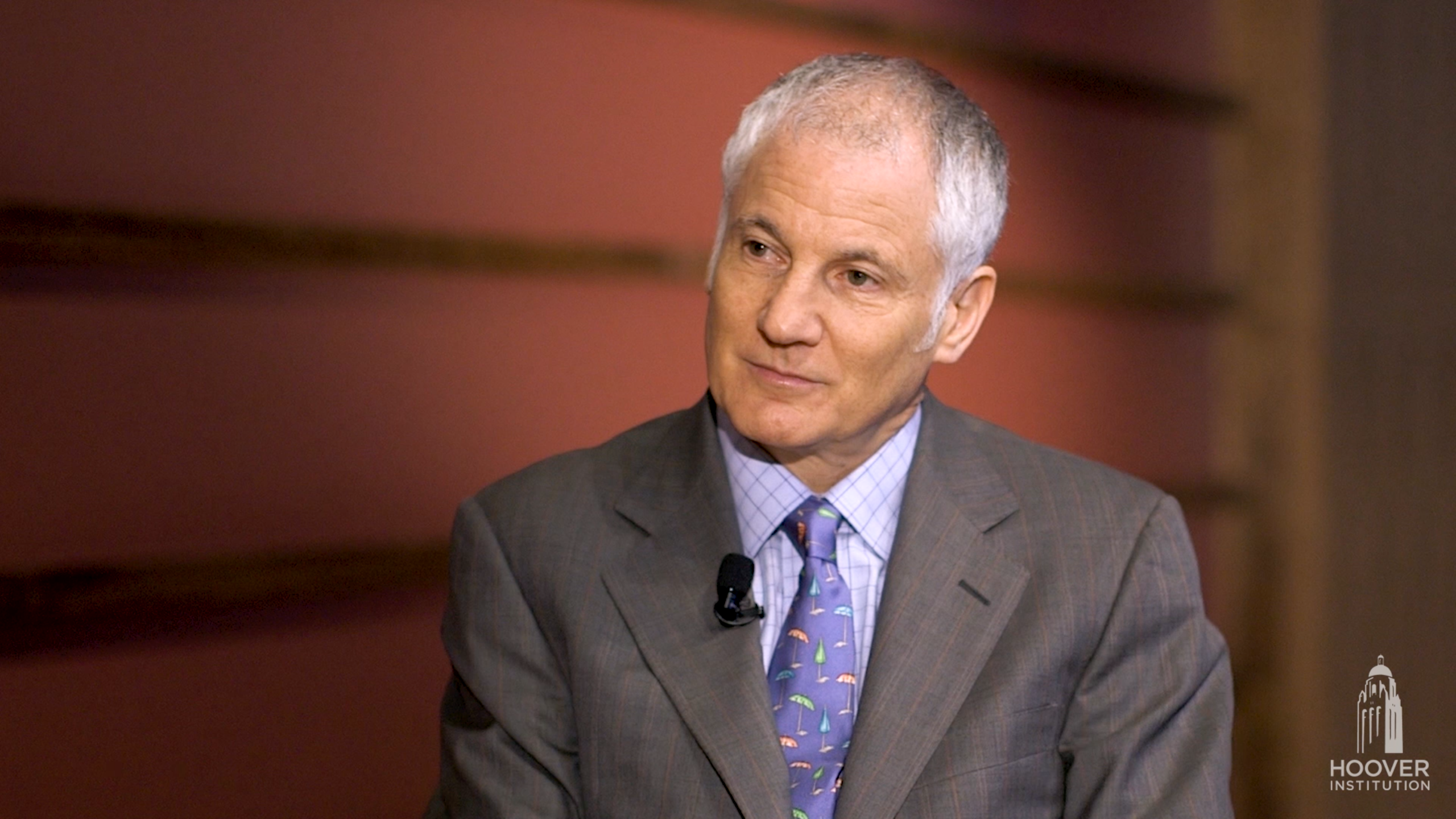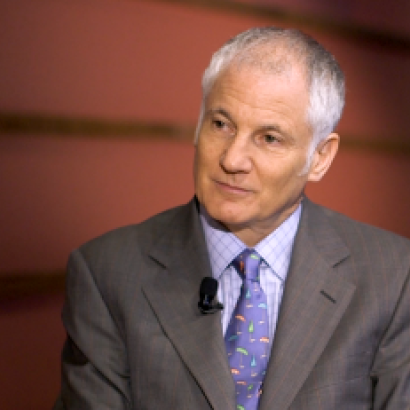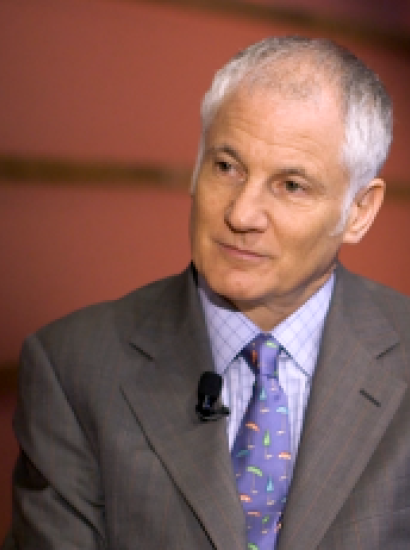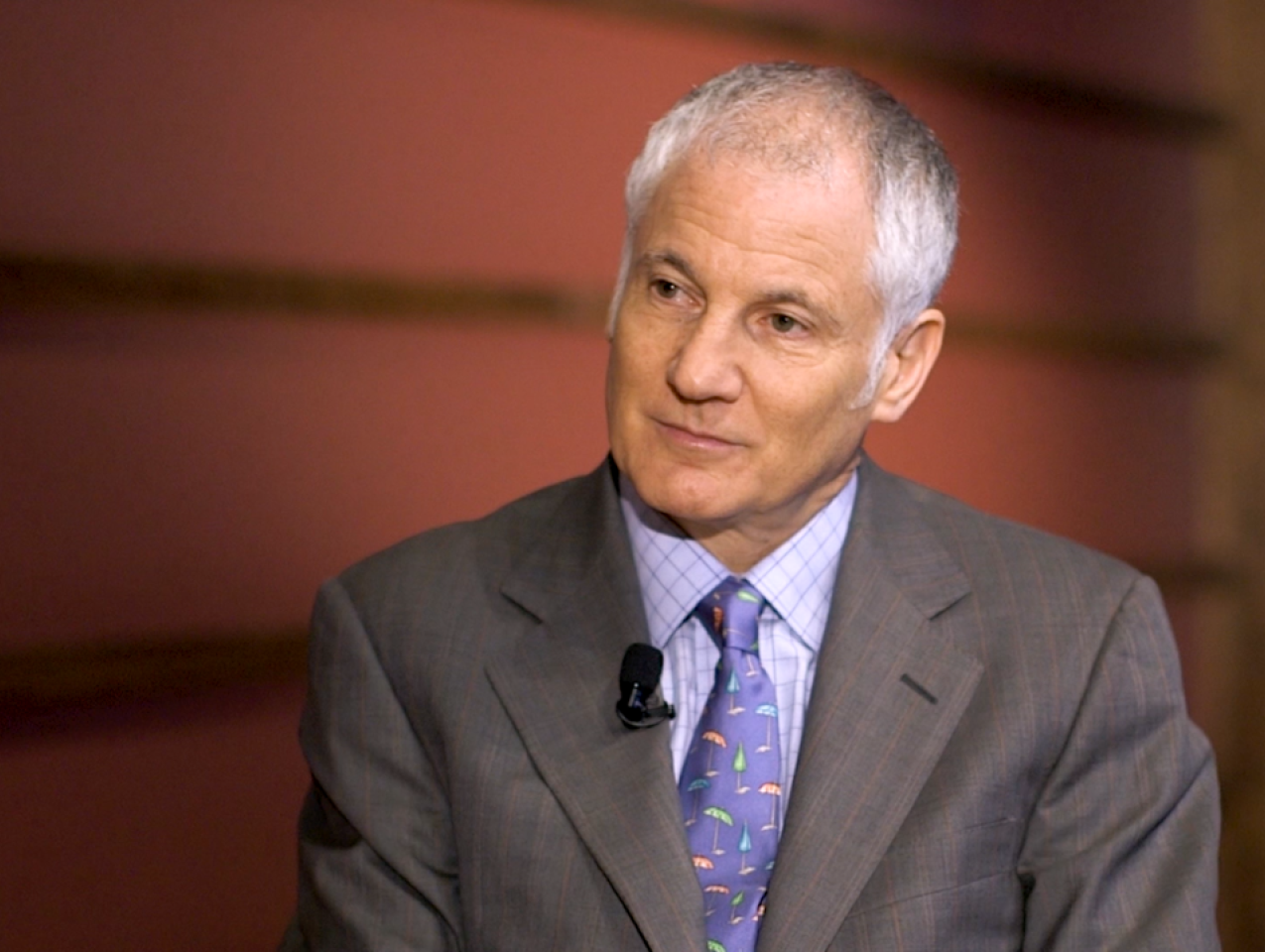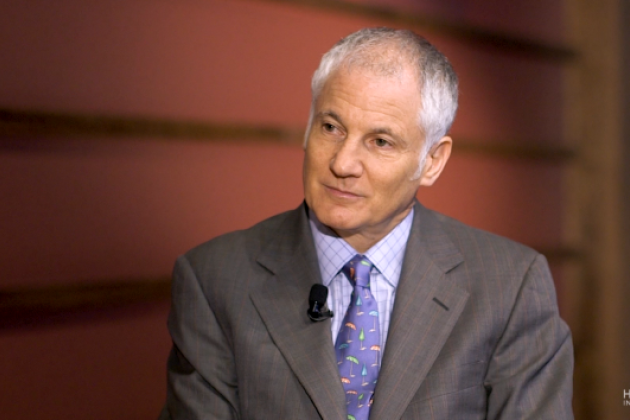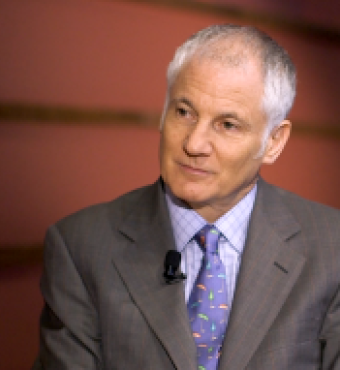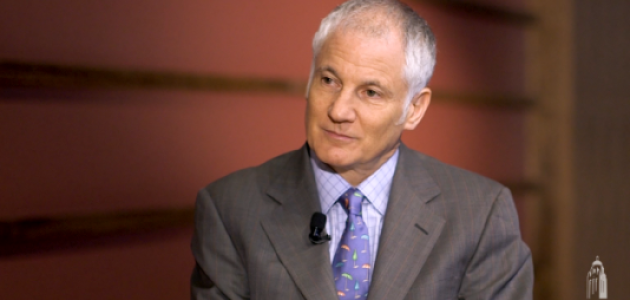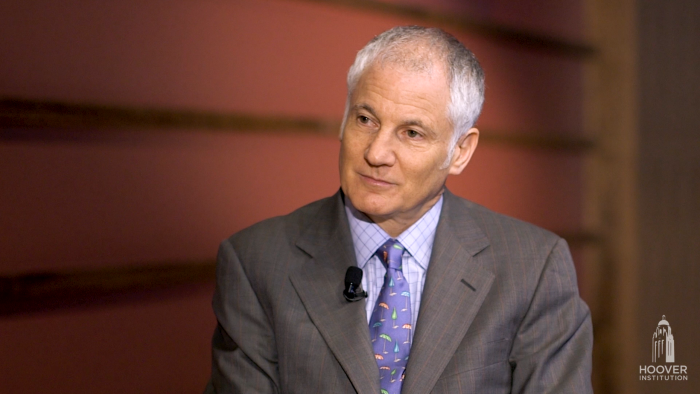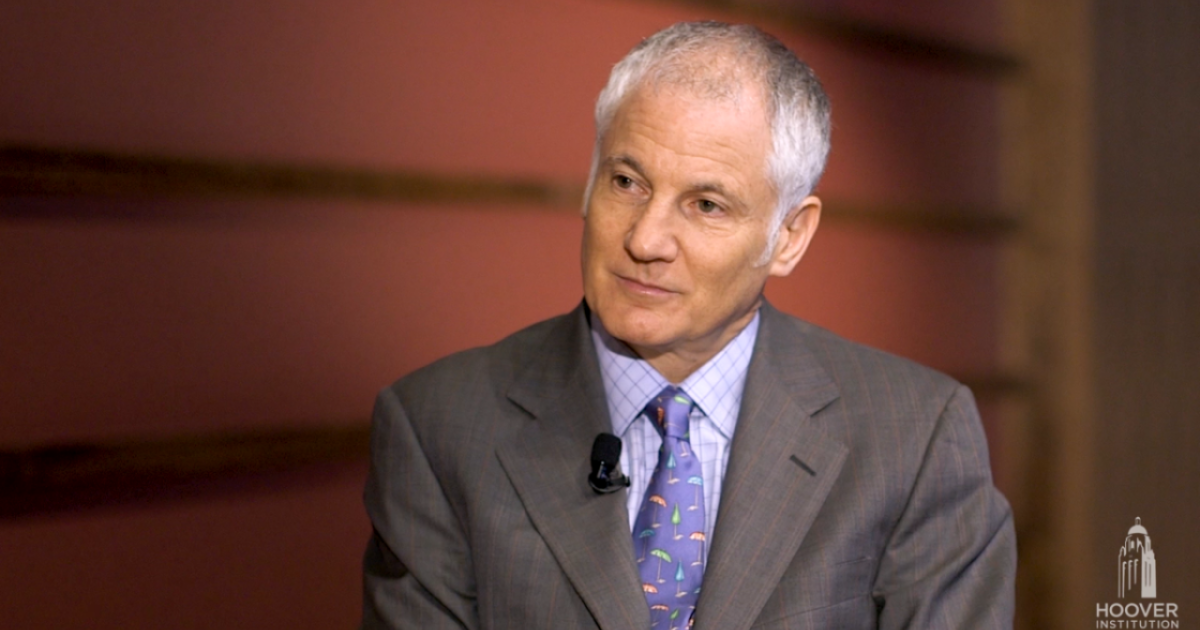- International Affairs
- US Foreign Policy
- History
- Military
- Contemporary
- World
Recorded on January 25, 2018.
“Joseph Stalin, Soviet dictator, creator of great power, and destroyer of tens of millions of lives …” Thus begins part one of this episode of Uncommon Knowledge, which dives into the biography of Joseph Stalin. This episode’s guest, Stephen Kotkin, author of Stalin: Waiting for Hitler, 1929-1941, examines the political career of Joseph Stalin in the years leading up to World War II, his domination over the Soviet Union, and the terror he inspired by the Great Purge from 1936–38.
“Why does Joseph Stalin matter?” is a key question for Kotkin, as he explains the history of the Soviet Union and Stalin's enduring impact on his country and the world. Kotkin argues that Stalin is the “gold standard for dictatorships” in regard to the amount of power he managed to obtain and wield throughout his lifetime. Stalin stands out because not only was he able to build a massive amount of military power, he managed to stay in power for three decades, much longer than any comparable dictator.
Kotkin and Robinson discuss collectivization and communism and how Stalin’s regime believed it had to eradicate capitalism within the USSR even in regions where capitalism was bringing economic success to the peasants, with the potential of destabilizing the regime. This led to the Great Purge, a campaign of political repression that resulted in the exile and execution of millions of people.
Additional Resources:
- Stalin: Waiting For Hitler, 1929-1941
- The Past Isn’t Even Past
- Communism’s Bloody Century
- When Stalin Faced Hitler
Peter Robinson: Joseph Stalin, Soviet dictator, creator of a great power and the destroyer of tens of millions of lives. With us today, someone who knows more about the life of Joseph Stalin than Joseph Stalin knew about the life of Joseph Stalin. Historian Stephen Kotkin on Uncommon Knowledge, now.
Peter Robinson: Welcome to Uncommon Knowledge, I'm Peter Robinson. We're filming today in the Hauck auditorium in the Traitel building, a new building of the Hoover Institution here at Stanford University. The son of a factory worker, Stephen Kotkin grew up in Washington Heights, New York. He graduated from the University of Rochester and then attended Graduate School at the University of Berkeley where he learned Russian, became fascinated with Soviet History and earned a Doctorate. Dr. Kotkin is now a professor of history at Princeton and a fellow that the Hoover Institution here at Stanford.
Peter Robinson: In 2014 Dr. Kotkin published Stalin: Paradoxes of Power, 1878 - 1928, the first volume of his projected three volume biography of Stalin, his life and times. Now, he has published the second volume, Stalin: Waiting for Hitler, 1929 - 1941. In the words of the Wall Street Journal, Stalin: Waiting for Hitler, this book represents "history on a grand scale. A book equal to the enormity of the events is describes." Stephen Kotkin, welcome.
Stephen Kotkin: So great to be back, Peter.
Peter Robinson: We'll come to the substance of this book in just a moment. First, the basic question. Students who will graduate from college this coming spring, your students at Princeton, students here at Stanford, they will have been born a full five years after the Soviet Union went out of existence. The country that Stalin built. Why does Joseph Stalin matter?
Stephen Kotkin: Well, Joseph Stalin is what we would call the gold standard of Dictatorship. Obviously, we're not talking about morality here, we're talking about accumulating and exercising power. If you're interested in power, where it comes from, how it works and what are the consequences when people exercise such power? Then Stalin is your guy. There are very few people in his category. Hitler, Mao, and that's about it. Hitler was in power for just 12 years. Stalin was in power for three decades. Mao was also in power for an extended period of time but didn't have the military industrial complex superpower that Stalin built. Stalin really stands out, even in his peer group.
Peter Robinson: All right. Collectivization. The book is divided into, it deals with three large categories, the first of which is collectivization. Collectivization, you're going to correct me on this, ties the peasants to collective farms, forces them to work on collective farms, ineffect, reintroducing serfdom. Have I got that right?
Stephen Kotkin: Yes, that's basically the story.
Peter Robinson: All right and you write here that Stalin, in imposing collectivization enslaved a hundred million people.
Stephen Kotkin: Yes.
Peter Robinson: Again, I got that right?
Stephen Kotkin: Yes.
Peter Robinson: Why? Why was that necessarily? Why was collectivization of such importance to Stalin?
Stephen Kotkin: In the old days, people argued that it was necessarily because this is how you modernized a peasant country.
Peter Robinson: Right.
Stephen Kotkin: You modernized the peasant country through coercion. You used the state to force everybody to do what the state needed them to do and that's how you built an industrial power out of a peasant country. The kind of Stalin was a necessarily argument which was quite prevalent for a long time. There's nothing necessarily about killing and enslaving this many people. It's never necessary to do that. You can modernize a peasant country in all sorts of ways, including through markets, property rights, a banking system that gives loans to people who succeed or have ideas that they think might succeed. However, in Marxism Leninism, collectivization was necessarily. That's what the book argues.
Peter Robinson: All right. Let's take that a little bit father. I'm going over the basics here, Stephen, because I'm conscious that ... Actually, I'm conscious of two things. One is that we've got an audience of Millennials here, college kids who -
Stephen Kotkin: Let's hope.
Peter Robinson: Yeah, exactly. Maybe you and I can just go door to door doing this in dorms around here. I'm also conscious that you just said ... It used to be taught that collectivization was necessarily. That actually is what I learned when I went through college myself. You are reteaching the man seated across from you. Marxism, Leninism and Collectivization is necessarily, how come?
Stephen Kotkin: Well, Marxism -
Peter Robinson: Within those terms, how come?
Stephen Kotkin: Marxism is about the transcendence of Capitalism. Capitalism is evil, alienation, exploitation, war, mass unemployment and depressions. In order to get to a better place in history, Marx argued Capitalism had to be transcended, the Hegelian word, [foreign language 00:05:50]. Marx had a stages of history notion. There was something called Feudalism, it was supplanted by Capitalism, Socialism would overcome Capitalism and eventually you'd get the final stage of history which was Communism. First you built socialism, and then you got the Communism. That's why it was called the Communist Party, and that's why they first built Socialism. Building Socialism as a segment, eradicating Capitals.
Stephen Kotkin: If Capitalism had markets, Socialism would have planning. If Capitalism had private property, Socialism would have collective property or state property. Capitalism had bourgeois Parliaments, Socialism would have people's power. This is the idea in Marx and Marx also spoke about freedom. He thought that not only would abundance follow from the transcendence of Capitalism but freedom will follow. However, of course, that's not exactly what happened, and so many people think Marx is not responsible for what came next.
Stephen Kotkin: When you say that Capitalism has to be eliminated, when you say you're going to get rid of markets and private property and checks and balances and all the rest on power, you're going to end up with the kid of regime that the Soviet Union got.
Stephen Kotkin: Now, about Collectivization, with the revolution in 1917 and remember there are two dimensions to it. First, there's the overthrow of the Czar in February of 1917, which is known as the February Revolution. Then there's this October Coupe, which is what Lenin called it, he called it a Coupe. Whereby a small group known as the Bolsheviks came to power, they would eventually, the next year, change their name to Communists.
Stephen Kotkin: Their notion was that the state should own and manage the economies. This was the case in the cities. They could take over industry, they could "nationalize industry" and then manage the nationalized industry. More of the regime was based in the cities, so there was a Socialism in the cities, almost from the beginning. The peasants revolted and the country starved, there was a tremendous famine 1921 - 1923.
Stephen Kotkin: They made a concession, the Bolshevik Regime which was self consciously building Socialism, nee Communist party now, made a concession to the Peasants. They would allow the Peasants de facto ownership of the land, and they would allow them quasi market relations. They could trade what they grew, as long as they paid a tax. There was a two fold system, Socialism in the city and Capitalism in the countryside. The regime felt constrained to grant this.
Stephen Kotkin: As a result, the country recovered from the revolution and Civil War destruction of 1917 - 1921 and by the end of the 1920s it had reached, more or less the level it was at before World War I, the 1913 - 1914 level. The rest of the world had grown and expanded and was richer and the Soviet Union was back to the level it was at ten years before.
Stephen Kotkin: Now you have this problem, you have a self-styled Communist regime, building Socialism with Capitalism in the countryside. Everyone in the regime believed that Capitalism in the countryside also had to be eradicated, but how were you going to do that? The regime was small, Communist party membership was small, and the Peasants were 120 million people across a sixth of the earth.
Peter Robinson: Just stop you there, everyone in the regime believed that they had to eradicate Capitalism in the countryside. Even though it was working?
Stephen Kotkin: Yes.
Peter Robinson: It was feeding the people. That is to say you see right away, that they are putting this construct in their minds, Marxism, Leninism, they're giving that priority over the reality on the ground.
Stephen Kotkin: Well ...
Peter Robinson: Is that fair?
Stephen Kotkin: Yes, it's very fair. They believed that Capitalism was evil.
Peter Robinson: All right, the point is they really, really believed this stuff.
Stephen Kotkin: They were true believing Communists. They had to get rid of Capitalism somehow. Moreover, as Marxists/Leninists they had the notion that the underlying social relations, which Marxists sometimes call the base, the relations of productions, the mode of production. The underlying social relations eventually determined the political system. Even if the country was recuperating, the capitalism in the countryside was a permanent threat to the existence of the regime because the underlying social relations threatened the regime at the top. They all agreed on this.
Stephen Kotkin: What they argued about was whether this could actually be done. For example, who was going to implant Socialism in the countryside? Who was going to take all that land away from the Peasants? How was that going to work? Wouldn't that be destabilizing? Wouldn't that ruin the economic recovery and maybe destabilize the regime? They had an argument about the timing of this and the methods of this but not the Principle that they were committed to Communism and therefore needed to eradicate capitalism in the countryside too.
Peter Robinson: Stalin was the one who did it.
Stephen Kotkin: Yes.
Stephen Kotkin: This is really remarkable. One issue is what motivated him, that's what we've been discussing.
Peter Robinson: Right.
Stephen Kotkin: Another issue is how in the world he was able to do this because ...
Peter Robinson: 100 million Peasants across a land mass that represents a sixth of the land on the planet.
Stephen Kotkin: Yes, yes.
Peter Robinson: Before the internet.
Stephen Kotkin: Could you imagine doing that? Let's remember that in in 1928, which is where Volume I ended, in 1928, 1% of the Arable land had been collectivized voluntarily. One percent. There was no voluntary collectivization. It was either coercion or live with Capitalism in the countryside and from their point of view, the eventual undermining of the political regime and the loss of the revolution. It was do or die and it had to be coercive, but the others resisted because they were fearful that it wouldn't be successful, that it couldn't be successful. Stalin challenged them and said, "You don't have the courage of your convictions. Do you believe that Capitalism is evil?" Yes. Do you believe we need to build Socialism? Yes. Well then what's your problem? Either we do this or we perish.
Stephen Kotkin: There was a geopolitical dimension to this as well because it was the idea that they needed to finance their industrialization. Now, they had repudiated the debts incurred by imperial Russia and by the provisional Russia, which was briefly in power between February 1917 and October 1917. The Soviet regime repudiated the international debts and so getting loans from the foreigners without repaying those debts was really not in the cards.
Stephen Kotkin: They thought that maybe they could internally generate the financing by getting a bigger harvest and gaining greater control over the disposition of the harvest and then selling a lot of that grain, exporting it for hard currency and then using the hard currency revenues to purchase the imported state of the art technology and machinery that would be part of their industrialization. Then they could build a military too and they could withstand the "imperialist antagonism" vis a vie the Socialism.
Peter Robinson: How did he do it, briefly how did he do it? What was the coercive method that took you from 1% Collectivization to substantially complete collectivization within what five years, six years?
Stephen Kotkin: Yeah. Let's remember that one person decided this. It's pretty astonishing. He didn't, for example, have to get a majority vote. Sure, he eventually got majority vote on X or Y, but that was after he created the fait accompli. After he just ordered the regime, the minions under him to do the stuff, and then he would go and get approval and if he didn't get approval, he would go back and do it anyway and create these fait accompli and use the secret police and use all his levers of power. He imposed collectivization on Eurasia and also on his own regime.
Stephen Kotkin: He was able to do that in part because his argument was compelling on the merits to them. Ideologically, they were in agreement with them. Additionally, he had a lot of urban activists, people who were young. In many cases part of the regime or wanted to be part of the regime and wanted to build a new world and were impatient that that new world should happen as soon as possible. We went a lot of these urban activists out to the countryside to become the kind of tip of the spear as it were, to force these issues.
Stephen Kotkin: The other thing he did was to instigate class warfare. Something called a kulak, which is a derogatory term that they used for better off peasants. Stalin introduced quotas for kulaks, rich peasants in each village, and those kulaks would be subject either to execution on the spot, summary execution or deportation internally to frozen wastes. If there was a village of 100 people, and Stalin would say we want 25 kulaks, well what was a kulak on the ground? The answer was, what if you have two cows? What if you have three cows? Do you need to have four cows? They debated this. The answer was, you had 25 kulaks or you yourself could be subject to deportation. They had to find 25, no matter how many cows they had. This was very divisive and people tried to defend and protect their own families. They didn't want to fall under the knife, under the deportation or the execution.
Stephen Kotkin: They began to finger their neighbors and others as the kulaks. If you criticized the policy but had no cows, you were ipso facto, a kulak henchmen or objectively in the pocket of the kulaks. With the quotas and the instigated class warfare in the village, he was able to create this chaos and then benefit from the chaos by using that as the instrument to force the collectivization of agriculture.
Stephen Kotkin: What is collectivization? What does that actually mean? In Russia, not in all of Imperial Russia because the Baltic states which were in the Russia empire, Ukraine for example, the Western Borderlands, didn't have the Commune. In Russia Proper, the majority of the peasantry, they had something called the Commune. The Commune was this instrument to redistribute the land, collective decision to redistribute the land. They would assign you strips of land to work, based upon your family size, how many mouths you had to feed. At the end of the year, if you had a birth or a death, they could readjust how much land you were assigned and maybe give some of your land to somebody else or take someone else's land to give it to you. In the mean time, you worked it as a private individual.
Peter Robinson: The commune is like a collection of the village elders. They get together to adjust land holdings each year.
Stephen Kotkin: That's right but they land is not collectively worked. They work it as individuals and as households. There's a private economy, with an occasional redistribution of the strips of land. That's what they've got before hand. There's defacto peasant ownership of the land. Collectivization is collective ownership of the land, and collective working of the land. You no longer a household farm that could grow if you're more efficient, you're part of a labor brigade. The tools are not yours and at the beginning the animals weren't theirs. Everything was collectivized. Eventually, the regime would make concessions and allow some things for the peasants to own and they would allow for household plots. They began to concede aspects of the markets that they had taken away coercively, but that was after all the people died.
Stephen Kotkin: This collectivization process, forced imposed on the country, through instigated class warfare, the secret police and the urban activists. This is the method Stalin had. Those who thought it couldn't' happen, even though they wanted it to happen, predicted disaster. They said to Stalin, "You know, this is going to be ... This is going to hurt the economy and maybe even destabilize the regime." It actually turned out much worse than the naysayers predicted.
Peter Robinson: The figures that you provide in the book between there's a good harvest in 1920 ...
Stephen Kotkin: 1929 - 1930.
Peter Robinson: It gets lucky.
Stephen Kotkin: Yes.
Peter Robinson: The rain is good, the conditions are good, there's a reasonable harvest.
Stephen Kotkin: The first year of Collectivization, there's a lucky harvest.
Peter Robinson: Then you get two, three bad harvests in a row, famine.
Stephen Kotkin: Yes.
Peter Robinson: Five to seven million people starve to death, another 50 to 70 million are malnourished, they starve but somehow survive.
Stephen Kotkin: Yes.
Peter Robinson: In the Kazak region, where the form of life had been nomadic and now under collectivization they're tied to the land. A fifth of the population dies, and in the Ukraine, again, it's village after village after village that simply starves to death.
Stephen Kotkin: Yes.
Peter Robinson: Within the Politburo, what's happening? People are saying, "Comrade Stalin, I told you we have a catastrophe here." Stalin does what? How does he manage to hold it together and work through this charnel house that he's ... into which he's turned the country?
Stephen Kotkin: This is also astonishing. The famine is very substantial. It's in Murmansk, in the polar North. It's in Georgia, in the semi-tropical south. It's in parts of Siberia. The ethnic Kazak population, about a third of the ethnic population perishes. I mean, that's just an astonishing number. The whole wheat belt, which is the richest soil, the best heart of the country's economy before this, the whole wheat belt suffers mass starvation and mass death.
Peter Robinson: Which is, we think of ...
Stephen Kotkin: Southern Russia, Ukraine, the Kuban, the Don River. It's really horrific. Stalin is getting reports about this. Now, he's making some concessions, for example, he reduces the quotas, the delivery quotas of how much grain each region is supposed to give to the state. They're grudging concessions, too little, too late, but he does concede, he allows some food aid to be taken from the warehouses and spread to the famine areas, once again, grudgingly, too little, too late. He knows a catastrophe has happened. He's got quite a lot of information about it. He doesn't know the exact size of the harvest, because the officials are over estimating it. He actually thinks there's more grain in the country than there is. This is something that most of the historiography has missed.
Stephen Kotkin: A bunch of officials begin to whisper that this guy Stalin is ruining the revolution. They weren't anti-communists, they were Communists, but they feared for Communism's fate. They whispered and they gathered and some of them actually wrote a treatise about the horrors about Stalin's leadership. The regime being what it was, people informed behind the backs of those who were whispering. The whisperers were arrested, and sentenced for essentially political crimes for speaking the truth. Stalin survived.
Stephen Kotkin: He survived because his inner circle closed ranks around him.
Peter Robinson: How big, roughly. Are we talking about a dozen people in this vast country.
Stephen Kotkin: Yes, we are.
Peter Robinson: A dozen.
Stephen Kotkin: We're talking about around a dozen, a little bit fewer, and they saw that despite the catastrophe that was unfolding, that none of them could lead the country. They saw Stalin was able to carry this regime on his back. Deal with international relations, deal with the culture, deal with the secret police. Stalin had tremendous aptitude in dictatorship, and they themselves were lesser figures. Moreover, they were uncertain what might happen if they retreated. It was one of those things where you're in really deep and you're looking at -
Peter Robinson: By now they're all complicit. Everybody feels he's in, everybody has blood on his hand.
Stephen Kotkin: Yes they are. His inner circle, if they had abandoned him, it would have been the end of his dictatorship. They stood by him. The whisperers, as I said were outed and arrested. Nonetheless, this episode of criticism got deep under Stalin's skin. He became infuriated with people who had the temerity to criticize him. Here he is, doing what's historically necessarily, eliminating Capitalism in the countryside. Come what may, whatever the cost might be. Paying the highest price.
Stephen Kotkin: He had the nerve and the ability to do that and they had the nerve to criticize him for it and it wrangled him for the rest of his life.
Peter Robinson: That's the collectivization bit. We have, I just have to express my frustration. We have a book of 900 pages, over 1,000 if you include the notes, and the richness of the book is in the detail. Every page there's a detail that just illuminates, we can't do that on television, Stephen. I just apologize and I urge the readers to pick up this book.
Peter Robinson: The Terror. I'm quoting Stalin waiting for Hitler. By the mid 1930s, we're through the Collectivization, he's pulled it off.
Stephen Kotkin: He gets a lucky harvest in 1934. The peasants don't want to starve, they want to survive. Those who haven't' been deported, those who have been enslaved in the Collective farms, they plant the grain, they harvest the grain, there's no drought, there's no torrential rain pour after the drought so they get lucky with the weather again and Stalin gets lucky. The peasants that he's enslaved saves, they save his regime and they save the country.
Peter Robinson: Breaks the resistance. He essentially begins to live with the system.
Stephen Kotkin: He's broken the resistance, you're absolutely right and, those officials who I criticized him, are now acclaiming him because they're on the other side of the horror, the famine is over, and they've eradicated Capitalism in the countryside. He's a hero now in 1934 again.
Peter Robinson: Right. "By the mid-1930s the revolution and Stalin's leadership were seen as having enabled a great country to take its rightful place among the powers." Russia is off its back and a great country, able to take its place with Germany, China, Britain, the United States. Now, here comes ... You're writing of the year 1936. "There was no immediate threat - social, economic, political - to the country or to the regime's legitimacy or stability, no crisis. But then suddenly, there was total crisis."
Stephen Kotkin: Yes.
Peter Robinson: Tell us about the terror.
Stephen Kotkin: This is the most difficult thing to explain. It's, the more you know about it, the less sense it makes. It's an episode that seems to defy rational explanation. We've had many people take a crack at this, in fact, thanks to Robert Conquest, who was a fellow here at the Hoover, we know the scale of it, and he properly named it the Great Terror, decades before the archives were open.
Stephen Kotkin: What could Stalin have been up to? With collectivization, this was necessary for the regime's survival according to Marxism/Leninism. You couldn't have Socialism in the city and Capitalism in the countryside, by their thinking. With the Great Terror, which is 1936 to 1938, about 830,000 are executed or die under interrogation. It's a very large number of people in just a few years to be killed. Then a couple of million are arrested, once again, largely for political crimes that are imaginary and then imprisoned, sent to the labor camps known as the Gulag.
Peter Robinson: These people are substantially drawn from the government apparatus, the party itself -
Stephen Kotkin: Yes.
Peter Robinson: - the military -
Stephen Kotkin: Yes.
Peter Robinson: - the whole apparatus that he's been using to impose his will on the country.
Stephen Kotkin: Yes.
Peter Robinson: Now he turns on the apparatus.
Stephen Kotkin: The loyal people. We understand that authoritarian regimes go after their enemies. Sometimes they stretch the enemy category, it becomes very elastic. This is pretty typical. For example, Hitler went after the leftists. He went after the Jews and Gypsies and other categories, we get that. Let's imagine for a second Hitler, could he have murdered his officer core? 90% of his top 300 or 400 officers? Could he have murdered his leading Nazi officials? The Gauleiter who ruled the provinces? His intelligence services, his diplomatic core, his industrial managers? Could he have murdered all of those people and in the process accuse them and gotten many of them to confess publicly that they were working as enemy agents the whole time they were Nazis, meaning that they were working for Judaeo-Bolshevik Communism, not working as committed Nazi party officials or officers.
Stephen Kotkin: It's just beyond belief that Hitler could have done that and if he would have tried that his regime would have survived.
Peter Robinson: Right.
Stephen Kotkin: This is what Stalin does. He murders his officer core, his diplomatic core, his intelligence officials, his party officials, his state officials. A good swath of the intelligentsia. Those aren't the only people caught up in the terror. Many ordinary people are caught up in the terror. What's astonishing is as you suggested, that it's the elites and moreover they're loyal people. They're committed to the cause. They were the ones who helped the collectivization happen.
Peter Robinson: These are the ones who stuck with him.
Stephen Kotkin: Yes. This is a deep conundrum, how to explain this. Ultimately what I decided to do, was to let Stalin speak and just listen to him talk during the Terror, to give as many quotes, sometimes long passages, what did he say he was up to? What did he say he was doing? It may not be a full explanation because this is an episode that as I said, it defies explanation. We begin to see some of how his mind was working during this episode.
Stephen Kotkin: We know the explanations that don't work. That he was targeting a Communist officials, those who were joined pre-1917 and the underground days, because they knew more about him and he wanted to suppress that and they knew he wasn't very bright and he wanted to get rid of them or whatever it might be. Well, they ... Communist Party Officials who joined before 1917 died in the same proportion as others in The Terror. There are many explanations like that, that don't work. That we know don't work based upon the research of other scholars.
Stephen Kotkin: The explanation, or let's say the ... The story, that I recreate goes as follows. One, he clearly wanted to break the will psychologically of the rest of his inner circle. His inner circle, his most loyal officials, didn't think that they were his replacements, they didn't aspire to replace him, but they acted as if they had minds of their own and they could maybe even debate with him and propose things and take initiatives. He broke all of them. A few of them committed suicide, and the rest of them became psychologically broken. That was clearly one of this motivations. He was converting his dictatorship into a despotism. His officials, his minions, he enslaved them the way he had enslaved the peasantry with collectivization.
Stephen Kotkin: Many dictators have this aspiration, but they don't have the wherewithal to pull it off. There are certain aspects of Communism that made this possible. The book explains the aspects of Communism, the ideology, the class warfare, the closed borders, the propaganda, etc. We shouldn't say that this was easy to do. It was possible not necessarily the way collectivization was from a regime point of view. It was possible because of the nature of the regime. He breaks the circle.
Stephen Kotkin: Another thing is the Trotsky obsession. This is really deep and remarkable, the ways in which Stalin got - Trotsky got into Stalin's brain.
Peter Robinson: Leon Trotsky, give us two sentences on who he was.
Stephen Kotkin: Trotsky was another great revolutionary. Tremendous personality, along with Lenin and Stalin and some of the others, who played a huge role in the 1917 revolution, the consolidation of the regime. He was the Commissar of War during the Civil War, from 1918 to 1921. Considered himself Lenin's heir, considered himself the brightest person in the regime.
Stephen Kotkin: He had some followers, but not nearly as many as we think. He was infact, deeply unpopular inside the regime, but he was a household name as famous as Lenin and more famous than Stalin in the early days of the revolution. Trotsky was never in power. There was no succession struggle to succeed Lenin as I showed in the first volume because Stalin was all ready in power from the spring of 1922, when Lenin appointed him general secretary of the party in April 1922 and then Lenin had a stroke in May 1922 and became semi-incapacitated. From that point on, the succession of Lenin was pretty clear.
Stephen Kotkin: Unless they were able to remove Stalin from power. Trotsky and others attempted to do this, but of course they failed. Trotsky was articulate. He dictated more than he wrote, but his published works were often polemically excellent. He called Stalin a lot of names that stuck, the "outstanding mediocrity of the Party", for example. The "grave digger of the Revolution", for example. These were great bon mot, as we say. He got under Stalin's skin and a crazy thing happened in 1936 in Spain.
Stephen Kotkin: Trotsky was writing these books, that's all he could do. He was from the foreign exile. Stalin had deported him externally first to Turkey, then to France. Ended up in Norway for a while and eventually Mexico.
Peter Robinson: There's an element also, Trotsky was unpopular within the Regime, but he was read in the West.
Stephen Kotkin: Yes.
Peter Robinson: He was very popular with the Communist Parties and Communist sympathizers, France, Italy, this country. He ends up in exile in Mexico. He's invited by the Mexicas to come to Mexico City.
Stephen Kotkin: You're exactly right. He's writing these anti-Stalin characterizations that are well done, and that have an audience. Stalin of course is infuriated by this and attempts to have Trotsky assassinated, but again, the attempts fail again and again.
Stephen Kotkin: In 1936 this crazy thing happens. There's a push in Spain, there's a Spanish republic, it's a popular front for Leftist republic, it's anti-clerical, Spain is a catholic country, a lot of people who hold to traditional values. The military doesn't like the Leftist coaliltion and they have an uprising of putsch, one of the principals is General Franco. Francisco Franco who will because the ruler. The putsch fails an as a result, there's a Civil War between the Franco Nationalists, Traditionalists on the one hand and the popular front, the legitimately elected government on the other hand.
Stephen Kotkin: Part of that popular front government, which is fighting Franco and to the left, Franco was called a Fascist, even though that's not an accurate description. He's more a traditional Rightist and authoritarian, but none the less a traditionalist. In any case, they call him a fascist and Stalin is blamed by Trotsky for not supporting world revolution. Here is it, the revolution in Spain is under attack by these Rightists that they're calling fascist and moreover, a group of them are enamored of Trotsky in Spain and they invite him to the country.
Stephen Kotkin: Can you imagine what's going through Stalin's head? Here, possibly, he's being accused of failing to support world revolution and Trotsky may show up in Spain and for all we know, might come to power in a piece of Spain, Barcelona, Catalonia. Today again, in the news. Trotsky might even come to power there for all we know. Moreover, Stalin has an agent in Trotsky's inside circle who's delivering the rough drafts of Trotsky's writings to Stalin, before they're even published.
Stephen Kotkin: Including this mammoth book called, "The Revolution Betrayed," which will be written by Trotsky and will be published soon. It's all about what we're talking about. Stalin receives a draft copy of this. Part of the motivated, believe it or not, is the deep obsession with Trotsky and the fear of Trotsky's what is ... Exaggerated power and influence because Trotsky is not going to come to power in Spain, etc.
Stephen Kotkin: Trotsky's obsession, Stalin's obsession with Trotsky is the second piece after the breaking psychologically of the inner circle.
Peter Robinson: Stephen, one last question for time reasons, one last question about the terror and then we'll get to Hitler in part II of our discussion. Here's the last question for right now. 830,000 people executed. Here's the piece that I myself have never understood. You can see as you mentioned under collectivization, you can see the rationale arriving from Communism. For the Terror, would you begin to feel is the precedence are the Asian despots. You can see Tamerlane and his mountain of skulls or Genghis Khan or Ivan the Terrible, within the Russian tradition. All that I can sort of get, but the confessions.
Stephen Kotkin: Yes.
Peter Robinson: He insisted on having them confess. It was enough for Ivan the Terrible or Genghis or Tamerlane just to kill them.
Stephen Kotkin: Yes.
Peter Robinson: Stalin wanted them to confess. We have, who's the general? Tukhachevsky, is that how it's pronounced?
Stephen Kotkin: Yes, that's right.
Peter Robinson: We have his confession and it's splattered in his own blood?
Stephen Kotkin: Yes, it is.
Peter Robinson: Why the confessions. Why was that important?
Stephen Kotkin: Yeah, I should say that the third important piece in the Terror, indirectly answers this question. That was, Stalin's notion that he could replace the elite with new, young people more from the soil, sons and daughters of the peasantry and the working class. Promote them to positions of authority, train them in Marxism/Leninism and they would carry the revolution forward. Wholesale replacement of the elite was also something which factored into his decision making in the terror. The confessions are first of all, people are forced to confess to crimes they don't commit. That justifies their arrest and executions. It also names other people to ramp up the number of arrests, because everyone is forced to name their accomplices in these crimes that they didn't commit.
Stephen Kotkin: It's also a way to explain it to the public. "Here it is. You doubt that these people are traitors? Listen to their confession, which is signed." Many of them had to appear at public trials, not just confess behind the scenes. Even behind the scenes, where there's no public trial, they extracted the confessions.
Peter Robinson: Why?
Stephen Kotkin: Part of it is the police doing their work. The police have arrest quotas. As I said, they need more people to arrest. The confessions produce additional names and then those additional names produce additional names. Kind of like a pyramid scheme, in a way. Also, Stalin is driving the extraction of the confessions. He wants them, they send them to him in draft. He edits them, adding information that should be in there or instructions to extract that information in further confessions. He takes the confessions, sometimes which he has ordered or edited. He shows them to other members of the inner circle and says, "See, I told you. So and so is a German spy. So and so is a Japanese spy, and you doubted it."
Stephen Kotkin: Stalin is driving this great terror. This is what Robert Conquest argued. He was absolutely right about this. We now have the documentation that Conquest gladly would have read if they had allowed him into the archives, but was secret during his lifetime. We can see that the great Terror is a gratuitous episode from the Marxism/Leninism regime's point of view. It's not a necessarily things like collectivization, it's something driven by Stalin, his personality, his obsessions. His anger over the criticisms during collectivization.
Stephen Kotkin: Tukhachevsky you've mentioned.
Peter Robinson: Tukhachevsky's a general?
Stephen Kotkin: That's right.
Peter Robinson: The officer corp
Stephen Kotkin: He's actually even higher than a general because he's a martial. He's one of five marshals, three of whom are arrested, in a room like this, the Hauck Auditorium. There's a meeting of the military men, those not arrested, to read the confessions of Tukhachevsky and the seven others that have been arrested and are executed behind the scenes, not in a public trial. Stalin wants them to read the confessions, then he makes s speech in front of them to justify the arrests and to explain hey Tukhachevsky was really a ... Their most talented military man was working for the Nazi's the whole time.
Stephen Kotkin: It's a rambling speech, there's a lot of it in the book, it's quoted at length. It's very incoherent, it doesn't seem very persuasive. It's like Stalin trying to persuade himself in some ways. In the middle of this rambling speech, he all of a sudden shouts out, Collectivization.
Stephen Kotkin: Now, what could collectivization have to do with the arrest of the military men. It's no abut the military man, it's about Stalin's own obsessions. Once again, something about Communism and the nature of this regime, makes this Great Terror possible. It's Stalin who does it and drives it. Collectivization is also only possible because of Stalin. I don't know any other man in that regime would could have done collectivization. The rest of the people in the regime wanted it to be done. The Terror is something different. It's Stalin's imprint but it's not something that others were asking for. That they then congratulated him on doing.
Peter Robinson: There we end Part I of our discussion of Stalin: Waiting for Hitler. Stephen Kotkin, thank you. For Uncommon Knowledge and the Hoover Institution, I'm Peter Robinson.







